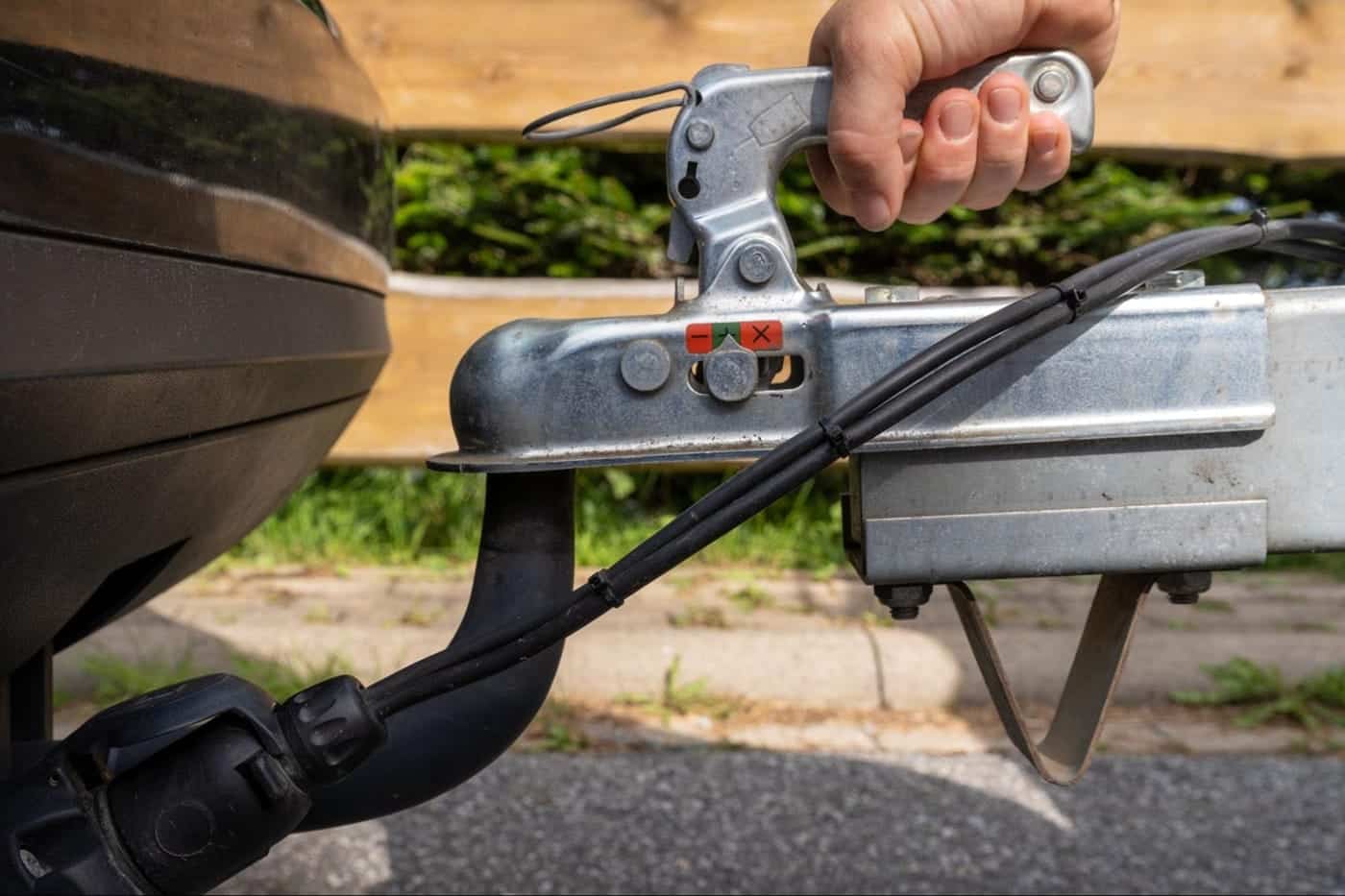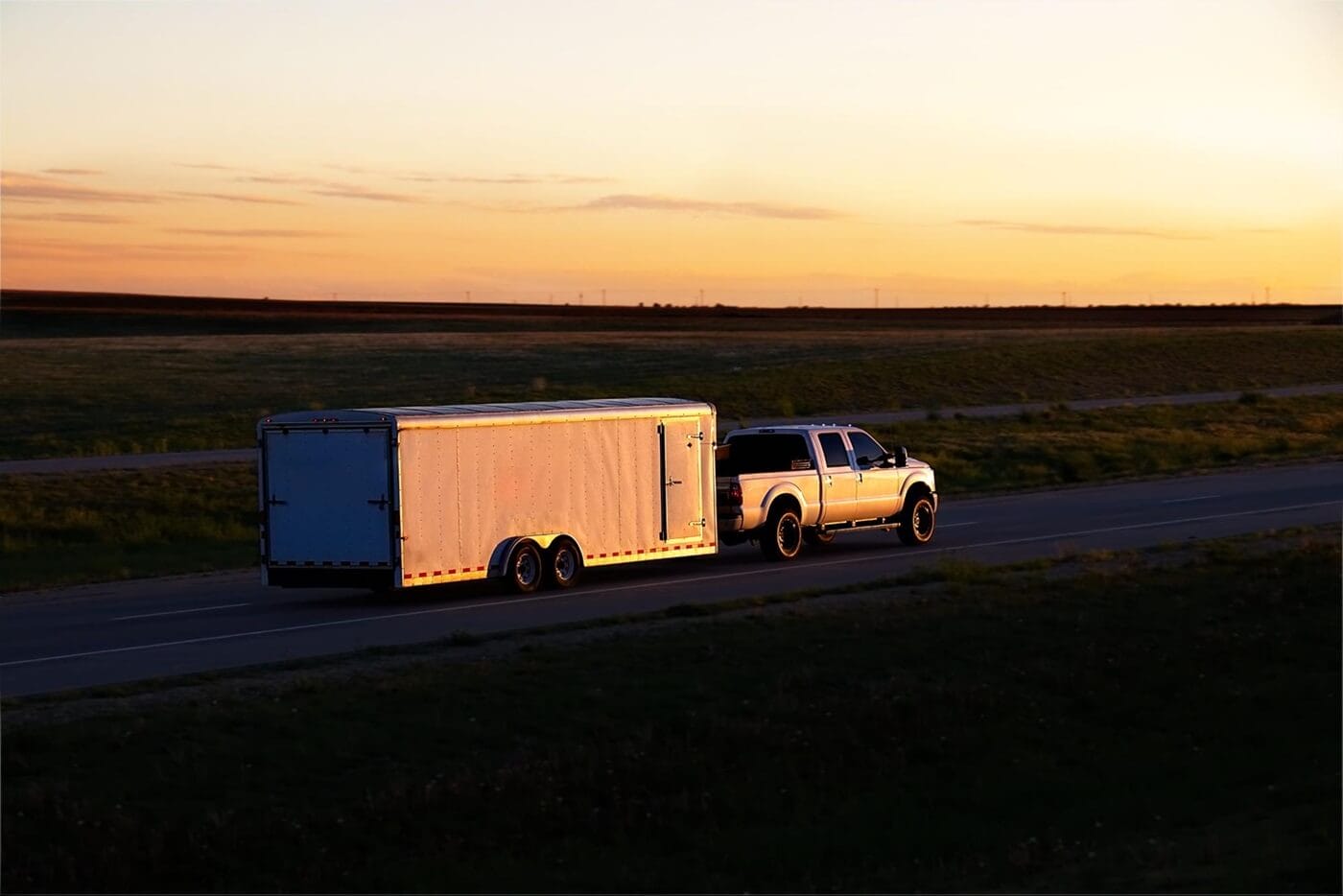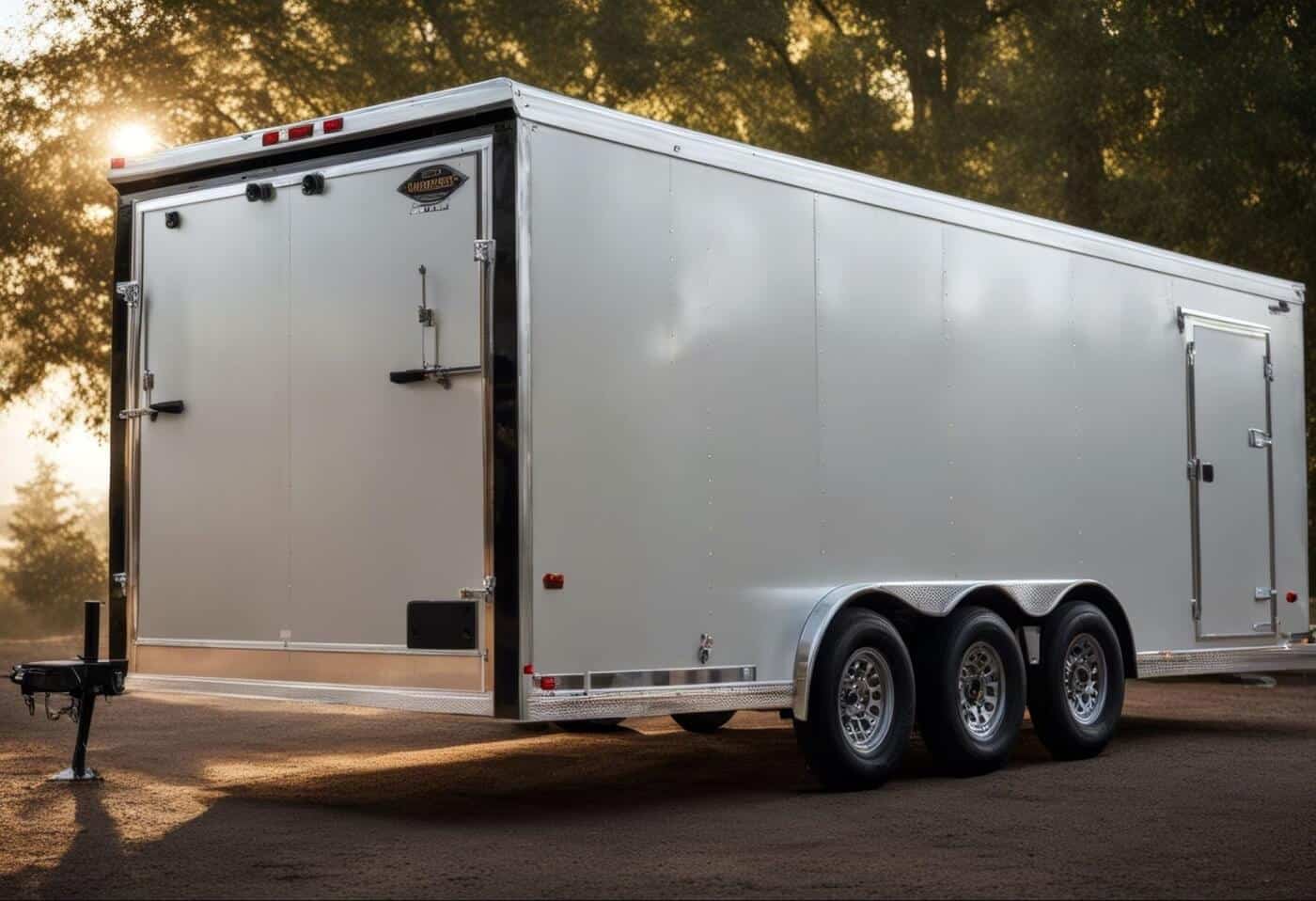Commonly overlooked but absolutely vital for safety, towing capacity is one of the most important factors to consider when you buy a trailer or choose a vehicle for hauling. But what is towing capacity, exactly?
Towing capacity applies to various scenarios, from moving equipment and trailers to using a camper. In layman’s terms, it merely refers to the maximum towing weight your car or truck can safely tow without damaging the vehicle or putting control at risk.
Anyone using a trailer should prioritize understanding towing capacity. Too much weight can overload a vehicle’s frame and suspension, making it harder to control and putting unnecessary strain on its engine and brakes.
Of course, it does get more complicated than that, so let’s take a look at the specific details to help you get a clear idea of how much towing capacity you need.
Towing capacity isn’t particularly complicated. It simply refers to the maximum weight your vehicle can safely tow. While the premise is quite simple, it is a hugely important number that helps you determine the safe limits of your vehicle’s towing abilities without risking damage or losing control on the road.
What Is ‘Towing Capacity’?
Your vehicle towing capacity is the sum of all weight the vehicle can pull, including the trailer and anything loaded onto it.
Your vehicle’s towing capacity is influenced by several factors, including engine power, transmission, suspension, and braking systems. Exceeding the recommended towing capacity can, at best, lead to mechanical failure. At worst, it will increase the chances of an accident by reducing overall driving stability.
To that end, it is incredibly important to know this figure before you hitch a trailer, as towing beyond the vehicle towing capacity could have dangerous consequences. In most cases, the towing capacity is listed in the owner’s manual or on the manufacturer’s specification sheet.
While manufacturers provide towing capacity ratings for each vehicle, be aware that these numbers assume ideal conditions. For example, a vehicle’s listed towing capacity might be based on having just the driver and no cargo inside the car.
So, when you calculate towing capacity, you will need to account for additional weight from passengers, gear, and even fuel, which all reduce the capacity you have left for towing.
This figure can vary based on factors like engine power, transmission type, suspension, and braking systems. More on that later.
Calculating your vehicle’s towing capacity is, again, quite simple. This basic calculation requires just a few simple steps, but it’s important to get it right to avoid overloading your vehicle.
Follow this simple formula to accurately calculate towing capacity and make certain that your vehicle is towing safely.
First, identify your vehicle’s Gross Combined Weight Rating (GCWR). This is the maximum total weight your vehicle and the trailer combined can handle together, including passengers, cargo, and fuel. You can find this number in your owner’s manual or on the manufacturer’s label inside the driver’s door.
Next, subtract the vehicle’s Curb Weight from the GCWR. The curb weight is the weight of the vehicle when it’s fully loaded with fuel but without passengers or cargo.
The formula looks like this:
GCWR – Curb Weight = Maximum Towing Capacity
For example, if your vehicle has a GCWR of 15,000 pounds and a curb weight of 7,000 pounds, your maximum towing capacity would be 8,000 pounds.
While it is a simple calculation, there is a caveat that complicates things just a little: this figure always assumes ideal conditions. If you plan to carry passengers or cargo, you’ll need to adjust the towing capacity downward. You should also check the weight of the trailer and its cargo to make sure it falls within this limit.
| Term | Definition | Example (in pounds) |
| GCWR | Maximum combined weight of the vehicle, trailer, and cargo | 15,000 |
| Curb Weight | Weight of the vehicle without passengers or cargo | 7,000 |
| Towing Capacity Formula | GCWR – Curb Weight = Towing Capacity | 8,000 |
When it comes to your vehicle’s towing capacity, things do get a little more complicated at this stage – other considerations exist apart from simple power under the hood. There are a few key components of your vehicle that play a huge role in determining how much weight you can pull without putting yourself or your vehicle at risk. Let’s take a look:
1. The Vehicle’s Weight
The heavier the vehicle, the more it can tow. That sounds simple enough, but it’s more about how well the weight of the vehicle and the trailer are balanced. If your truck or SUV is already loaded with people, gear, and extra cargo, it’s going to really eat into your overall tow capacity. That’s something to keep in mind when figuring out your towing capacity.
2. Engine Power
A big engine doesn’t just help you go faster—it’s what gives your vehicle the strength to tow heavier loads. More torque and horsepower mean better pulling power but don’t overdo it. An engine too small for the load can overheat or strain, and suddenly, that trip with your trailer becomes a lot more complicated.
3. Braking System
Pulling a trailer means you’re not just thinking about how to move all that weight but also how to stop it. Your vehicle’s brakes are designed to handle its own weight but add a trailer, and you’re working the brake system much harder. The stronger your brakes, the safer it is to stop with a load in tow.

4. Suspension
Your suspension probably isn’t at the forefront of your mind when pondering, “What can my truck tow?” However, if your suspension is weak, your vehicle may sag under the weight, which throws off balance and control, especially when turning or stopping. This is crucial when considering maximum towing capacity.
5. Transmission Type
Automatic transmissions tend to handle towing better because they shift more smoothly. Add four-wheel drive to the mix, and you’ve got a setup that can handle tough terrain or bad weather without breaking a sweat. Manual transmissions might work fine, but they can be trickier to manage when you’re pulling a heavy load.
Financing Options
With our flexible financing options, quality trailers are more attainable than you might think.
Key Points to Remember:
The balance between these factors is important when working out your vehicle’s towing capacity, so make sure to get the details right before you hit the road.
You will find that a vehicle’s towing capacity varies significantly across different classes, from smaller family SUVs to heavy-duty commercial trucks. As always, knowing how much your vehicle can tow will help avoid damaging it (or risking safety on the road).
The towing capacity of SUVs, for example, is usually lower than that of trucks, although it still provides enough power for light trailers or small campers. Generally speaking, that is.
If you need to tow heavier loads, trucks offer higher towing capacities (again, generally speaking). Full-size trucks like the Ford F-150 or Chevy Silverado – depending on the engine and configuration – can tow between 7,500 to 14,000 pounds. These two trucks are among the most commonly seen towing when it comes to hauling larger trailers, boats, or construction equipment.
However, even within the truck towing category, towing capacities can vary based on the vehicle’s build and equipment. As you would expect, a half-ton truck will always have a lower maximum capacity than a three-quarter-ton or one-ton model. This is why it’s important to check your vehicle’s manual (or use a towing capacity chart) to figure out how much your truck can tow based on the specifications.

For lighter truck towing capacity (such as towing a small trailer or boat), midsize SUVs like the Toyota Highlander or Ford Explorer offer a great balance of power and daily convenience. With an ability to tow between 3,500 and 5,000 pounds, these vehicles (and others like them) are good for recreational towing while remaining practical for everyday use.
Either way, always refer to the vehicle towing capacity to avoid exceeding what your truck or SUV can safely handle.
Again, towing limits depend on the type of vehicle you’re driving, and while they’re pretty simple to figure out, they are not always straightforward. As noted, larger trucks and SUVs generally have the most pulling power, but even within the same class, there can be wide differences.
If you’re hauling a trailer, camper, or other heavy equipment, knowing the towing capacity of your vehicle before starting your journey will negate serious risk and keep you safer.
Here’s a breakdown of typical towing capacities by vehicle class. Keep in mind that these are general figures – each vehicle model can vary depending on the engine, drivetrain, and even extra towing packages. Once again, we would remind you to always double-check the owner’s manual to ensure you’re within the recommended limits.
| Vehicle Class | Typical Towing Capacity |
| Subcompact SUVs | Up to 2,000 pounds |
| Midsize SUVs | 3,500 to 5,000 pounds |
| Full-Size SUVs | 7,000 to 8,500 pounds |
| Midsize Pickup Trucks | 5,000 to 7,500 pounds |
| Full-Size Pickup Trucks | 8,000 to 14,000 pounds |
| Heavy-Duty Pickup Trucks | 15,000 to 37,000 pounds |
Use this chart as a quick reference, but don’t rely on it entirely, as towing capacities can vary quite a bit based on how your vehicle is set up. Factors like the number of passengers, extra cargo, and even the hitch type can impact how much your vehicle can safely pull.
At the risk of stating the obvious, choosing the right towing capacity really depends on what you plan to haul. If you’re towing a small utility trailer, you won’t need as much as someone pulling a large camper or heavy enclosed trailer. The idea is to make certain your vehicle can handle the combined weight of the trailer and its cargo.
You can start by considering the heaviest load you will need to tow. If your calculations are right, this should give you a clear idea of the minimum towing capacity you need. Once again, always check your vehicle’s manual to find the maximum tow capacity for your specific model. If you’re hauling a camper, for example, check how much towing capacity you need for a camper based on its weight.
Towing Capacity Expert Tip!
As a general rule, it’s always better to have a little more towing capacity than you think you will need. This gives you a buffer in case you underestimate the total weight or need to carry more gear.
Either way, the question of “how much can I tow” really boils down to more than your vehicle’s rating, but rather an understanding of the total weight involved.
So, how much towing capacity do you need, in summary? The answer lies in knowing the total weight of your load and choosing a vehicle that exceeds that amount. Figure it out precisely to prevent strain on your vehicle (and, more importantly, safety on the road).
If your vehicle’s current towing capacity isn’t quite up to the job, there are ways to boost it through slight modifications. Of course, there are limits to what you can safely tow – but these adjustments can help you get closer to your towing goals without risking your safety or the vehicle’s health.
The first step is to ensure you know how to calculate towing capacity, as explained in previous sections. Armed with this information, you can work out the maximum towing capacity your vehicle can handle after upgrades.
Let’s look at some potential ways to improve the vehicle towing capacity.
1. Upgrade the Hitch:
A higher-rated hitch can make a huge difference to your truck towing capacity. For example, switching to a Class IV or V hitch can allow you to tow more weight than a lower-rated option.
2. Install a Weight-Distribution Hitch:
These hitches distribute weight evenly across all axles, improving balance and control when towing heavy loads. As an added bonus, this can also reduce sway, which means it will be easier to handle large trailers.
3. Reinforce the Suspension:
Adding heavy-duty suspension components can help manage the additional weight when towing. Upgrading your leaf springs or shocks provides better support for the increased load on your vehicle. It may sound like a large job, but if you plan to haul regularly, it will be worth the effort and expense.
4. Add a Transmission Cooler:
Towing puts extra strain on your transmission, which means potential overheating. Installing a transmission cooler helps regulate temperature, allowing your vehicle to tow heavier loads without causing damage to the transmission.

5. Upgrade the Brakes:
Stronger brakes are always a prerequisite when towing heavier loads. Installing larger brake pads and rotors can help your vehicle stop more effectively and safely, especially when hauling more than its original capacity.
Getting the most out of your vehicle’s towing capacity just requires a little common sense. Always make sure your upgrades are compatible with your vehicle and that you don’t exceed the manufacturer’s recommended limits.
Exceeding your vehicle’s towing capacity isn’t just ‘a bit risky’. Doing so can seriously damage your truck and compromise the safety of everyone in the vehicle, and other motorists. So, how do you make sure you’re staying within the safe limits of your tow capacity? Let’s take a look.
Looking for a Custom Trailer?
Our Design Your Own Trailer service offers expert guidance throughout the buying process so you can create the perfect trailer.
There are plenty of myths about your vehicle’s towing capacity that can lead to unsafe or even downright dangerous practices. We would prefer you avoid disaster by knowing these myths. To that end, let’s debunk a few.
One common misconception is that if your vehicle is rigged to pull a trailer, it must be safe to do so. Unfortunately, this isn’t true. Just because a vehicle can tow a load doesn’t mean it can handle the weight safely for the long haul. Overloading your vehicle can damage the engine, brakes, and suspension.
Another myth is that towing ratings only apply to the trailer itself. In reality, they take into account the combined weight of the trailer and everything you load onto it. So, asking, “How much can my vehicle tow” means factoring in all the extra gear, passengers, and even fuel.

People also often assume that bigger trucks automatically mean higher towing capacity. While larger vehicles tend to tow more, this isn’t always the case. The overall setup, including engine power, transmission, and axles, determines what towing capacity means for your specific vehicle.
Lastly, many believe that if they upgrade their hitch, they can automatically increase towing capacity. While a stronger hitch helps, it doesn’t change the manufacturer’s rating for your vehicle. It’s important to always follow those guidelines for safe towing!
Safety should always be a priority, especially if you’re new to hauling heavy loads. Here are a few essential tips to keep in mind before you hit the road:
When it comes to vehicle towing capacity, common sense is your greatest ally. That, and a clear understanding of your vehicle’s capabilities. Just consult your vehicle’s manual and weigh it against the weight you intend to haul. If the latter is greater than the former – and that includes the load and passengers – you are good to go!
Remember, exceeding the truck towing capacity can result in severe damage to your vehicle’s components and increase the risk of accidents due to compromised handling and braking.
You can then distribute the load evenly in your trailer, keeping the heaviest items low and centered. Always use the appropriate towing hitch and make sure your trailer’s braking system is in good working order.
Of course, towing a reliable trailer can make all the difference in the success of your haul, ensuring smooth transport and peace of mind on the road. If you’re looking for a trailer you can trust, Millennium Trailers offers a broad range of high-quality trailers at extremely healthy prices.
Millennium Trailers has earned a first-class reputation over the years for providing high-quality trailers at reasonable prices. We’ve helped thousands of customers across all states find the perfect trailer for their hauling requirements, and our selection is among the most extensive you will find.
Millennium Trailers also provides:
Browse Our Full Selection of Trailers
Questions? Contact Millennium Trailers today, and let us help you find the perfect trailer for your next adventure!
Millennium Trailers is your trusted partner for high-quality trailers at unbeatable prices. Serving all 50 states, we’ve delivered over 5,000 trailers nationwide.
Established in 1998, we’re a company dedicated to meeting your hauling needs with excellence. Whether it’s cargo trailers or custom living quarters, we provide a wide range of options to suit your requirements. Our knowledgeable and friendly team ensures a smooth buying experience with personalized assistance. Proudly offering competitive pricing, state-of-the-art designs, and easy financing options. Committed to customer satisfaction, we strive to simplify the process of finding your perfect trailer.
Choose Millennium Trailers for a reliable, customized solution that delivers quality and value for your investment.
Copyright 1998 – 2023 Millennium Trailers, Inc.